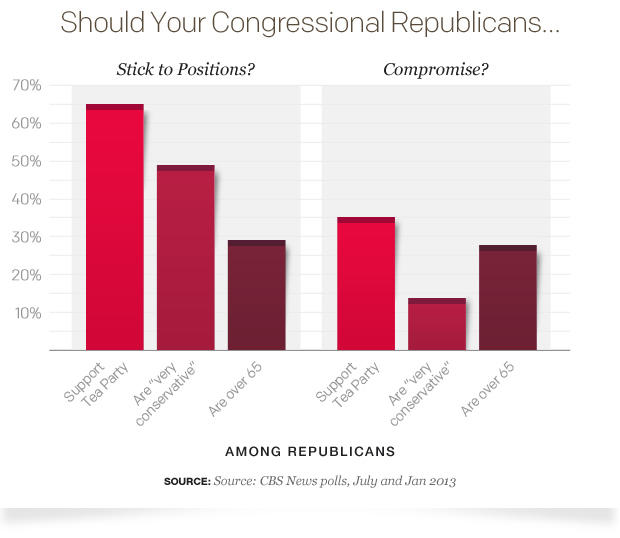Republicans vs. tea party sets 2016 stage
With another presidential cycle starting in just two years, battle lines are being drawn - not between the two parties, but within the Republican Party itself.
Interestingly the differences being aired this summer seem less about ideology than approach: Whether compromise with Democrats is ever okay; even more broadly whether government can or even should try to solve problems through policy or lawmaking. So while most Americans reflexively say they want "something done" there's plenty of difference in defining what that means, and these debates have huge potential to shape the GOP's brand in 2014 and certainly in 2016.
It's playing out now - as a raft of reliably conservative Republican senators have drawn 2014 primary challenges or the ire of tea party and other groups angry about the budget deals including Senate Minority Leader Mitch McConnell in Kentucky, Lamar Alexander in Tennessee, Mike Enzi in Wyoming and Lindsey Graham in South Carolina.
And it is affecting top leaders who are mentioned as Republican presidential candidates in 2016. New Jersey Gov. Chris Christie framed the party's choice of direction as about "winning" (read: coalition building, when needed) or not, if it instead chases ideological purity. Former Florida Gov. Jeb Bush has warned Republicans not to be seen as "anti-"everything. (On the Senate side Alexander, for his part, responded to his challengers much in the same vein as Christie, drawing lines between speech-making and his desire for action.)
Meanwhile Enzi's challenger in Wyoming's GOP primary, Liz Cheney, defines staunch opposition to President Obama not as obstructionism, but patriotism. Texas Sen. Ted Cruz, one of the party's rising stars, similarly argues for sticking to principle no matter what. The latest talk, by Cruz and others, of shutting down the government in order to defund Obamacare has driven a wedge into the party's caucus right along these very lines. (Sen. Richard Burr of North Carolina answered back calling it the dumbest idea he'd ever heard.)
The electoral pressure is coming from that part of the GOP base that simply doesn't want compromise - at least not with this current crop of Democrats, anyway - and while they're a small sliver of the electorate overall, they vote in primaries and have to be reckoned with.
In two CBS News polls this year we've asked whether Republicans in Congress should stick to their positions (even if that means Congress doesn't get as much done) or should compromise. Majorities of Republican voters consistently say compromise, as do all Americans, but about a quarter say "stick to positions," so we combined a couple of polls to get enough sample of them to examine.
They're almost twice as likely as other Republicans to be tea party backers, three times more likely to call themselves "very" conservative (as opposed to just conservative or moderate) and they're older - a hallmark of the primary electorate, especially in midterms.
Some of this dynamic is the natural result of a party being out of the White House, looking for a national message and deciding - to whatever extent it gets to decide - whether it will be better defined for its opposition to the sitting administration, or by its own ideas and successes. (Those two aren't always mutually exclusive, either.)
But there's a new twist now, too: for the very conservative base this opposition also comes from a philosophically different conception of what it means to "get something done." That phrase is perhaps too often assumed to mean that legislation equals accomplishment, but not everyone sees it that way. When voters believe government can't help things, or that the way to progress is first by reducing it, then enacting legislation or even continuing funding isn't an achievement.
It's this view that also, perhaps, helps push these intraparty arguments more into the realm of process instead of legislative proposals. Or, as House Speaker John Boehner, R-Ohio, put it on "Face the Nation" this summer in what was surely a nod to that base, the House might be better judged not by how many laws it passes, but by how many they repeal.
Part of this also results from would-be 2016 candidates needing to draw distinctions in a party that's become very ideologically cohesive.
Taking into account positions on range of issues, not necessarily willingness to deal - the rank and file of the GOP have become more thoroughly conservative. There's not all that much room for their suitors to maneuver.
The candidates' offices matter too: Republicans have a lot of governors on their bench, executives who would tout their own achievements in their states and grab the mantle of "effective" - like Christie, John Kasich of Ohio who's up in the polls; Scott Walker of Wisconsin and Bobby Jindal of Louisiana.
House and Senate Republicans, meanwhile, work under the veto threat, and will likely hold on to their majority in 2014 with a big assist from the base, since they already represent very conservative places.
And that base values opposition to the president quite highly.
Our polls show very conservative Republicans think Democrats and the president start off being too extreme, so they'll be naturally skeptical of any legislative deals made, even if the GOP gets a lot of what it wanted.
The biggest signal of direction, though, may be how the party plays the 2014 midterms: will congressional Republicans run mainly as a check on the White House, or on proposals of their own?
If the economy is improving, they could argue that divided government is working, and try to highlight their recent cost-cutting message and deficit focus as prime reasons; as tangible achievements. Then again, that would surely mean sharing some credit - and maybe even making more compromises - with the administration, which won't be easy to do and still keep the base happy.

